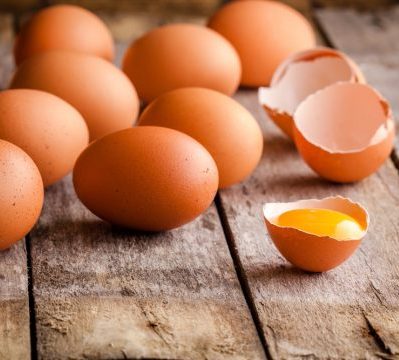If there is one food that seems to be universally associated with high cholesterol it is the infamous egg.
 This is because a single medium-sized egg yolk contains around 186 mg of cholesterol. Up until 2015, this would have been considered a staggering 62% of the recommended daily value of cholesterol consumption. That means just two eggs a day would have put you well over the recommended daily limit!
This is because a single medium-sized egg yolk contains around 186 mg of cholesterol. Up until 2015, this would have been considered a staggering 62% of the recommended daily value of cholesterol consumption. That means just two eggs a day would have put you well over the recommended daily limit!
No wonder eggs were so vilified.
High levels of cholesterol, particularly LDL (Low-density lipoprotein) cholesterol, are a notable risk factor for cardiovascular disease such as heart attack and stroke. For decades, researchers and health organizations have believed that dietary cholesterol from foods such as eggs would directly raise the levels of cholesterol in your blood.
The History of Dietary Cholesterol Recommendations
In 1961 the American Heart Association (AHA) released the recommendation that adults “should reduce intake of cholesterol.” By the year 1968, the recommended limit of dietary cholesterol was set at 300 mg per day. Then in 2001, the National Cholesterol Education Program guidelines recommended that those at high risk for a cardiovascular event limit cholesterol intake to less than 200 mg per day.
Things have changed, however. As of 2015 there are no longer specific limits on the amount of cholesterol that is consumed from food. The adjustment is due to an advancement in our understanding of how the body handles dietary cholesterol.
It turns out that the more cholesterol you eat, the less your body actually produces.
Cholesterol Regulation
Cholesterol is critical to proper functioning of the body. It is the structural foundation of the membrane surrounding every single cell in your body. It is also necessary for the formation of hormones such as estrogen, testosterone, and cortisol.
Because cholesterol is so important, the body is able to produce the cholesterol that we need in the liver.
When cholesterol is consumed in foods such as egg yolks, the body actually compensates for this extra cholesterol by producing less in the liver. In this way, blood cholesterol levels are actually kept relatively stable even in the presence of high amounts of dietary cholesterol.
There have been studies that have shown a very slight increase in overall LDL cholesterol levels in those who consume eggs regularly, but it turns out that the increase is in the LDL particle pattern A which actually lowers risk of heart disease. And this is not the only science vindicating the egg as a healthful addition to your diet.
The Science of Eggs and Cholesterol
In 2016 the American Journal of Clinical Nutrition published a study of more than 1,000 middle-aged men. The researchers found that consuming up to one egg per day was not associated with an increased plaque formation in the carotid artery. This effect was consistent even in the participants who had a strong genetic susceptibility to elevated cholesterol levels. The authors concluded, “The health effects of eggs, or any other food, cannot be reliably determined by a single nutrient in the food, such as cholesterol.”
Additionally, the Journal of the American College of Nutrition published a meta-analysis which suggests that eating one egg a day can actually reduce the risk of stroke by 12 percent without affecting the risk for coronary heart disease. The authors said that “eggs are a relatively low cost and nutrient-dense whole food that provides a valuable source of protein, essential fatty acids, antioxidants, vitamins & minerals.”
Nutritional Properties of Eggs
Egg whites contain high-quality protein consisting of all nine essential amino acids. Eggs yolks also contain a myriad of fat soluble vitamins and minerals. Eggs are one of the few dietary sources of vitamin D. Eggs also contain choline, vitamin A, vitamin B12, riboflavin, selenium, lutein, and zeaxanthin.
With all things considered, it turns out that eggs have little to no negative impact on risk for heart disease and may actually be cardioprotective in some cases. This combined with the incredible nutrient density of eggs, and it is safe to say that you can consume eggs without worry.
References

















